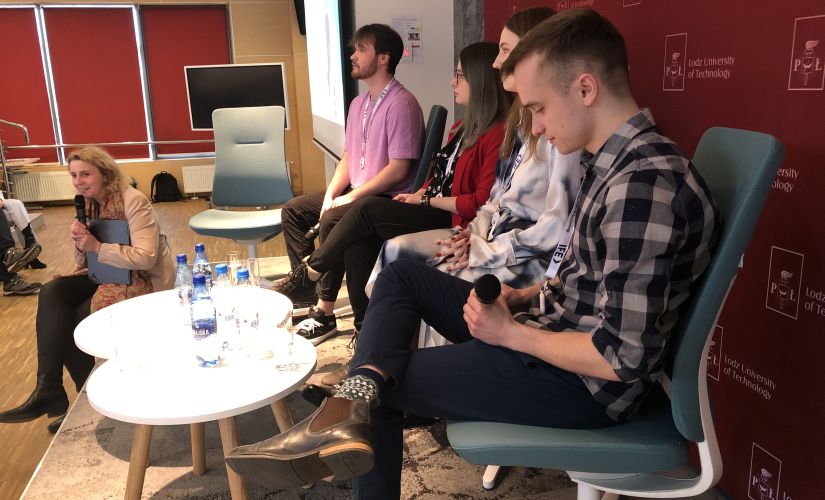Participants of the conference were welcomed by the project coordinator dr inż. Dorota Piotrowska, TUL professor, Director of the Center for International Cooperation (CWM), while the opening lecture, Teaching and Learning after Covid-19 avalanche, was given by Janet Frizzarin, a CWM affiliate.
An important highlight of the program was the discussion panel How best to support students in their studying/learning process?, featuring representatives of the participating universities: dr inż. Dorota Piotrowska, TUL professor, Rosa Estriégana, PhD, Soraya Garcia-Esteban, PhD, the University of Alcalá, Spain, professor Andy Junker, and professor Frank Ulrich Rückert, of the University of Applied Sciences in Saarbrücken, Germany, and Natália Martins, PhD, and professor Paulo Cachim, the University of Aveiro, Portugal.
The second part of the event included workshops to present the methods and tools developed by the project team. Workshop topics included Microcredentials in practice, Survival Kit Toolbox for distance and non-distance Teaching&Learning, Gamification in practice, and Coffideas - find new inspirations for your teaching strategies. The conference concluded with a debate with student participation called What teachers can learn from students - how to build learning partnerships at the university? The students brought their perspective and proposed new solutions geared towards increasing their engagement in the classroom.
Students were a crucial group of project participants. Their participation in summer schools Smart Gamification in Practice and the 21st Century Skills Survival Camp for Students helped develop a motivational strategy and a system to reward students' active participation in the classroom.
Testing gamification models
The Smart Gamification in Practice school was conducted in a hybrid form. It included two five-day meetings (in Lodz and Saarbrücken) and working in virtual space. With the participation of students, gamification models were tested with particular attention given to the eight types of intelligence classified by Howard Gardner: logical-mathematical, linguistic, natural, musical, spatial, bodily-kinesthetic, interpersonal and intrapersonal. Working with the aid of modern IT tools proceeded in international teams. Various activity reward systems were employed, including 'smarts' - points exchanged for material rewards. Collaboration with students resulted in the development of gamification models to increase student motivation and engagement.
Awarding micro-credentials
The 21st Century Skills Survival Camp, on the other hand, provided an opportunity to test on a group of twenty students from four countries another method of incentivization, the award of micro-credentials. Modeled on the Scouts, the system involves the award of merit badges, in this case digital ones. During their week-long stay in the Mazurian Lake District, the participants, living the life of yachtspeople or scouts, took part in various activities to learn new skills that would be difficult to master in their daily lives. Struggling with inclement weather and other adversities compelled them to work as a team and take a more imaginative approach to problems. Consequently, they developed competences currently in demand on the job market.
Implemented solutions
As a result of the project, comprehensive solutions were developed and implemented to increase the level of student-teacher interaction and enhance student motivation. To that end, teachers participated in training sessions on micro-credentials, badges, visual content, smart gamification, and innovative student-activating methods. The training materials developed in the project were translated into Polish and can be further used. Interactive toolkits and student activation methods were also produced during the project. Easy-to-use mechanisms are now available online.
The project e-CLOSE A model for Interactive (A)Synchronous Learning in Online STEM Education was carried out within the framework of the Erasmus+ Program Strategic Partnerships for Digital Education in the Higher Education Sector.

